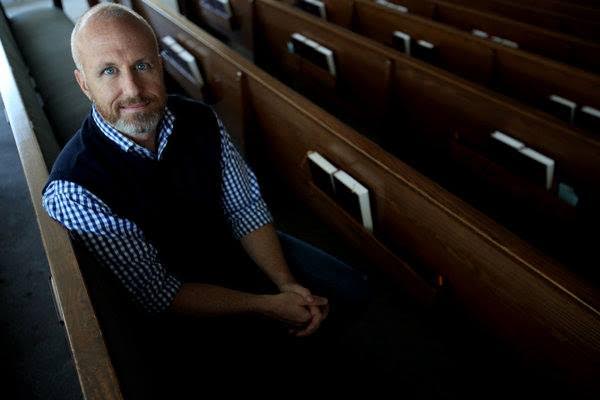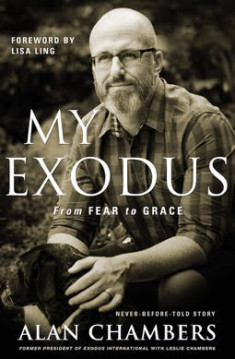In 2013, Alan Chambers apologized to the LGBT community for the damage he caused at the helm of Exodus International – formerly the world’s largest ex-gay group. The apology shocked conservative Christians who for two decades used Chambers as a poster boy for so-called reparative therapy.
At that time, Chambers said his core beliefs hadn’t changed. He still believed that that marriage was meant to be between a man and woman. Now Chambers and his wife, Leslie, have written a book, My Exodus: From Fear To Grace — their views on marriage have evolved.
(This interview has been edited and condensed for clarity and length.)
What made you decide to write the book?
Coming out of Exodus, we felt like there is a story to be told. We started thinking about how we could tell the story because we knew people were going to have questions about what we did. I started thinking about writing some sort of book before Exodus closed but could not hone in on what exactly I wanted to say. My first thought was, “don’t edit me.” I have been edited for so long I did not want my story to be edited any longer.
In My Exdous: From Fear To Grace, you described your role in promoting reparative therapy at Exodus as complicit. Were you?
I definitely take ownership. For me, there was a part of it that I just stepped into. When I got involved with Exodus [reparative therapy] was just the norm. I got involved as a 19-year-old kid it was kind of like growing up in the church – you sit there for so long and it was just what you believed.
[Reparative therapy] was just something that was the overarching belief. This is what causes homosexuality and this is what you do to get over it. The things [about reparative therapy] I learned when I was young, and the ways they were taught, made sense to me. It seemed like it was the majority story for LGBT people. [Reparative therapy] was the end all be all to being gay.
The longer I was there I would question certain things. I changed the narratives as I was examining my own life and the people that I was meeting. We began to make adjustments, like not calling ourselves ex-gay and being critical of different parts of the therapeutic process that we found objectionable. For example, things like “holding therapy.” As we began to chip away at it, I found there was so much more I disagreed with.
I absolutely own it. I perpetuated a lot of shame and unhealthy religion that ensnared me and so many other people.
READ: Let the churches say amen to ban on LGBT ‘conversion therapy’
Should reparative therapy be outlawed?
I support, and I’ve written about this, a ban on reparative therapy for minors. It perpetuates shame and I think it is dangerous. When it comes to the therapeutic niche of reparative therapy where psychotherapists and certified professionals are providing therapy with goals to change sexual orientation – that should absolutely be banned.
For adults, I appreciate what the state of California did that requires adults to sign a duty to warn. [They should have] participants sign a disclaimer noting sexual orientation doesn’t change and that it can be harmful. There need to be greater safe guards for adults. For children, I don’t think they should be subjected to that at all.
That does not mean we should tell pastors they couldn’t help their parishioners. We could run the risk of infringing on their religious freedoms. I do not think pastors should tell their kids that their orientation can change—that’s dangerous. But I think we should be educating pastors on how to respond to their gay youth.
How do you respond to people who say if you truly believed in God’s power your sexual orientation would change?
As a man who has same-sex attractions who has an orientation that is gay — but who is happily married to a woman and contentedly and successful in every aspect of that — there is no point for my sexual orientation to be changed. To want to change…that is unimportant to me. I do not think changing your orientation is something anyone experiences.
If your biblical understanding of sexuality is such that gay is not something that you can reconcile, I don’t think that straight is better. I think there are all sorts of downfalls to heterosexuality as well. When it comes to the conservative view of salvation – it’s not straight or gay that gets us to heaven. It’s Jesus. Sexuality in that part is irrelevant. We’ve made far too big of an issue of it so much so that we’ve damaged people and I think we have to stop doing that.
READ: Ex-gay stories flourish when bisexuality is ignored
Your ambiguity and outright refusal to label your sexuality seems as if you’re still playing into religious communities’ change narrative. Why won’t you label your sexuality?
I believe sexual orientation is a part of everyone’s life. Whether they have a gay or straight orientation… and there are some people who have no orientation as in they’re not sexually driven at all. My primary orientation is same-gender.
If you’re going to nail me down on what has been the predominant orientation in my life — it’s that. As a married man, whether I had a straight or gay orientation, my orientation is fixed to my chosen partner. As a married man, I give the most energy to that as I think every married couple should.
When Leslie and I are having sex she’s not screaming “I’m so glad you’re straight” or “I’m so glad you’re gay.” It’s irrelevant. I love and am able to have sex with my wife.
As I am telling the story through my book, I am recounting my truth in the moment. I was trying to be straight but really I was gay. Now at this point, I do not choose a label because there is not one that is best for me. Now, if someone were to call me straight I would challenge them. If someone where to call me gay or bisexual, I would not necessarily challenge them. Those labels seem insufficient.
Where do you stand on same-sex relationships? Are you affirming of them?
I do believe that same-sex relationship can be holy. As a Christian, I think marriage is best. That is why I’m supportive of the Supreme Court decision for the legal recognition of same-sex marriage. I think same-sex marriages can reflect, and often do, God’s image. Many people in the church either do not know of Christ-centered same-sex relationships or refuse to see them. Leslie and I have met so many individuals who have awesome stories and are doing amazing work. Their marriages absolutely reflect the image of God.






